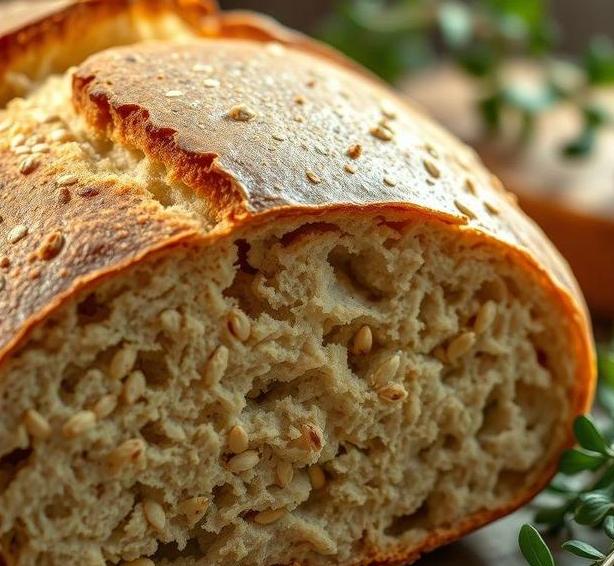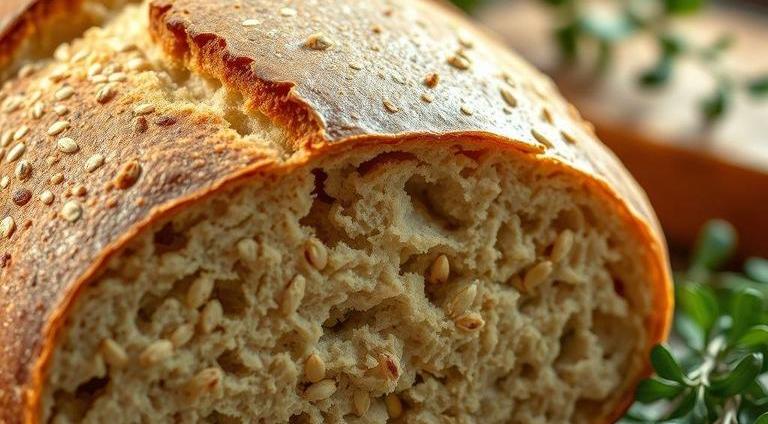Sprouted bread is a unique and healthy alternative to traditional white or whole wheat bread, made from sprouted whole grains that are rich in nutrients and easier to digest. Unlike conventional bread, which relies on refined flour, sprouted bread uses grains like wheat, barley, or rye that have begun to sprout, boosting their nutritional value. The sprouting process breaks down starches into simple sugars, making the bread a lower glycemic option. It’s often touted for its high fiber, increased vitamin content, and its digestibility compared to regular bread.
However, just like any other food, sprouted bread has a shelf life and can go bad. If you’ve ever found a forgotten loaf in your kitchen or pantry, you might be wondering if it’s still safe to eat. In this guide, we’ll explore how long sprouted bread lasts, the signs that it’s gone bad, and the best ways to store it to maximize its freshness.
Can Sprouted Bread Go Bad?
Yes, sprouted bread can go bad. While it may have a healthier profile compared to traditional bread, it is still made of natural ingredients, which means it is perishable. Many people are surprised to learn that sprouted bread tends to spoil faster than its refined counterparts. The reason? Sprouted grains are moist and full of living enzymes, which provide excellent conditions for mold or bacteria growth if not stored properly.
The shelf life of sprouted bread is influenced by several factors:
- Moisture Content: Sprouted bread has a higher moisture content compared to regular bread, making it prone to quicker spoilage.
- Lack of Preservatives: Many sprouted bread brands avoid using artificial preservatives to maintain the bread’s health benefits, making it more susceptible to spoilage.
- Storage Conditions: The environment in which the bread is stored plays a major role. High humidity and fluctuating temperatures can accelerate the spoiling process.
So while sprouted bread can last for a while, it does eventually go bad if left unchecked. It’s important to understand its limitations and know how to handle it properly.
Shelf Life For Sprouted Bread

The shelf life of sprouted bread varies depending on how it’s stored, but it generally doesn’t last as long as conventional bread. Here’s a breakdown:
- Room Temperature: When stored at room temperature, sprouted bread typically lasts 3 to 7 days. Keep it in a cool, dry place, and make sure it’s sealed tightly to prevent air exposure, which can promote mold growth. However, the bread will lose its freshness and texture the longer it’s kept out.
- Refrigeration: If you want your sprouted bread to last a little longer, refrigerating it can extend its shelf life. When stored in the fridge, sprouted bread can last 7 to 14 days. The cold temperature slows down the growth of mold and bacteria but can also dry out the bread. To counteract this, you can toast or warm it before eating to restore some of its softness.
- Freezing: For the longest shelf life, freezing sprouted bread is your best bet. Frozen sprouted bread can last up to 6 months, maintaining most of its flavor and texture when thawed. Make sure to slice the bread before freezing so you can take out only what you need without thawing the whole loaf.
Common Signs Of Spoilage
It’s important to know when sprouted bread has gone bad, as eating spoiled bread can lead to foodborne illnesses or digestive discomfort. Here are some common signs to watch out for:
- Mold: Mold is the most obvious sign that your sprouted bread is no longer safe to eat. Mold can appear in various colors, including green, black, or white. If you spot mold anywhere on the bread, discard the entire loaf-mold can spread rapidly, and cutting it off won’t make the bread safe.
- Off Smell: Fresh sprouted bread has a mild, slightly nutty aroma. If the bread starts to smell sour, rancid, or overly fermented, it’s a sign it’s past its prime. This change in smell typically occurs due to bacterial growth or the fermentation of the natural sugars in the bread.
- Texture Change: Sprouted bread tends to have a moist, hearty texture. If it becomes excessively hard or dry, it might not be moldy yet, but it’s a sign that it’s losing its freshness. If the bread feels slimy or sticky, it’s time to throw it out.
- Discoloration: Sometimes, sprouted bread will develop discoloration, such as dark spots or an overall faded look. While this isn’t always harmful, it’s often an indication that the bread is no longer fresh and could be heading toward spoilage.
How To Store Sprouted Bread?

Proper storage is key to extending the shelf life of sprouted bread. Here are some tips for keeping it fresh for as long as possible:
- Keep It Sealed: Always store sprouted bread in an airtight container or wrap it tightly in plastic wrap or a resealable bag. This helps prevent the bread from drying out and minimizes exposure to air, which accelerates spoilage.
- Store in a Cool, Dry Place: If you plan to eat the bread within a week, store it in a cool, dry place like your kitchen counter or a bread box. Just make sure it’s away from heat sources, like the stove, and humidity, like a dishwasher or sink area.
- Refrigeration for Longevity: For extended freshness, put sprouted bread in the fridge. Make sure the bread is properly wrapped to avoid it absorbing any unwanted odors from other foods in the fridge. Just remember that refrigeration can affect the bread’s texture.
- Freeze for Long-Term Storage: Freezing is the best way to store sprouted bread for months without sacrificing too much flavor or quality. Slice the loaf before freezing so you can take out individual pieces as needed. You can freeze the bread in a plastic bag or wrap it tightly in foil to prevent freezer burn.
Expert Tips
- Avoid Refrigeration Unless Necessary: While refrigerating sprouted bread extends its shelf life, it can also affect its texture. If you don’t have to refrigerate it (because you’re going to eat it quickly), it’s better to keep it at room temperature to preserve the taste and feel of the bread.
- Use a Bread Box: A bread box offers an ideal storage environment because it keeps the bread in a dark, dry place, preventing it from drying out while keeping air circulation optimal. This is a great option if you want to store bread on the counter.
- Revive Stale Bread: If your sprouted bread has gone stale but is still safe to eat, you can revive it by spraying it lightly with water and warming it in the oven for a few minutes. This can bring back some of its moisture and softness.
- Look for Additives: Some brands of sprouted bread may add preservatives or stabilizers to extend shelf life. If you buy packaged sprouted bread, check the ingredient list for any additives if you’re concerned about the bread’s purity.
FAQs
How Long Does Sprouted Bread Last?
Sprouted bread typically lasts for about 5-7 days when stored at room temperature. If stored in the fridge, it can last up to 10-14 days. Freezing it can extend its shelf life to 3-6 months.
What Signs Indicate That Sprouted Bread Has Gone Bad?
Signs that sprouted bread has gone bad include mold growth, an off or sour smell, a change in texture (such as being too hard or slimy), or visible signs of rotting or fermentation.
Can Sprouted Bread Spoil If Not Refrigerated?
Yes, sprouted bread can spoil faster if left at room temperature for prolonged periods. It is recommended to store it in a cool, dry place or refrigerate it to extend freshness.
Does Sprouted Bread Need To Be Refrigerated?
While sprouted bread does not absolutely need to be refrigerated, doing so can extend its shelf life, especially in warm climates. Refrigeration helps slow down the staling process and prevents mold growth.
Can You Freeze Sprouted Bread To Prevent It From Going Bad?
Yes, freezing sprouted bread is an effective way to preserve it. Wrap the bread tightly in plastic wrap or aluminum foil, then store it in a freezer-safe bag to prevent freezer burn.
How Can I Tell If Sprouted Bread Is Still Fresh Without Opening The Package?
If the bread is in its original packaging, check the expiration date printed on the label. You can also check for air bubbles or condensation inside the package, which may indicate spoilage.
Can Sprouted Bread Get Moldy?
Yes, like any bread, sprouted bread is prone to mold growth if exposed to moisture or stored improperly. Mold can develop even faster if the bread is left in a humid environment or not sealed properly.
Is Sprouted Bread Healthier And More Likely To Last Longer Than Regular Bread?
Sprouted bread contains more nutrients due to the germination process of the grains. However, this does not necessarily make it last longer. It may spoil faster if not stored properly, though its nutritional benefits may make it a better choice for some.
Can Sprouted Bread Be Stored In A Breadbox?
Yes, sprouted bread can be stored in a breadbox. A breadbox provides a dry, cool environment that can help keep the bread fresh for a few days. However, for longer storage, refrigeration or freezing is recommended.
Is It Safe To Eat Sprouted Bread After Its Expiration Date?
It depends on the bread’s condition. If it shows no signs of spoilage like mold, an off smell, or a sour taste, it may still be safe to eat for a short time after the expiration date. However, always use your best judgment and err on the side of caution.